It was George W. Bush who said: “Sometimes in this world you make unpopular decisions because you think they’re right.” But of course, as Bush himself proved, he could also be proved to be wrong on occasions. Quite a few occasions, actually: the reasons for entering the Iraq war springs to mind, along with his failure to take the threat of terrorism seriously before the 9/11 attacks on the World Trade Centre, and his failure to address economic conditions and regulatory policies that ended in the housing bubble and financial crisis in the United States, but there are many more. Speaking of American presidents, the new head of the EU’s European Council, Janez Janša, Prime Minister of Slovenia, won’t have made many friends in the White House by claiming that Joe Biden took the Presidency by cheating and that Donald Trump is the real president, denied his rightful place by a fraudulent election. He’ll have made a friend of Jake Angeli, however, who is also known as the “QAnon Shaman”, “Q Shaman”, and “Yellowstone Wolf”, a dedicated conspiracy theorist who, at the time of writing, is behind bars awaiting trial on six criminal charges and who was a leading light (if that is even an appropriate description) in the group of armed extreme right-wingers who stormed the Capitol in Washington in an unsuccessful bid to prevent Congress from confirming Biden’s presidential election victory. Closer to home, when Slovenia’s turn at the helm of the European Council came around, the prospect of Janša being in charge seems to have set the alarm bells ringing. After all, he’s on record as being opposed to many of the declared principles of the EU.
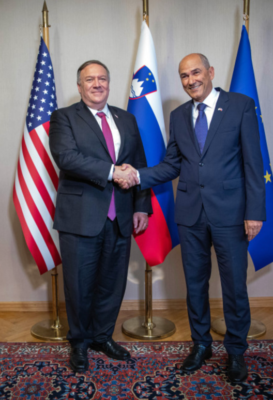
Slovenia is, of course, a small country of just two million people. That’s more-or-less the same size in population terms as Latvia and actually smaller than, for instance, Wales, in the United Kingdom. Welsh nationalists may take some comfort from that. Cymru am byth! (It means Wales for ever, by the way). Unlike Wales, however, Slovenia is an alpine nation, surrounded by Austria, Croatia, Hungary and Italy. Janša, who is close friends with neighbouring leader Viktor Orbán, believes his country is ‘misunderstood’ and a victim of double standards at the hands of the European Commission.
Certainly, Janša has proved himself a problematic leader for the Commission. He has as yet declined to nominate two candidates for the European Public Prosecutor Office (EPPO), which has been set up to try to ensure that money from the EU budget isn’t misused. This has led some critics to call for Slovenia’s share of the EU’s €750-billion COVID-19 Recovery Package, to be held back. Janša, quite reasonably, pointed out that the five EU member states that haven’t joined the EPPO – Ireland, Poland, Hungary, Sweden and Denmark – have nevertheless benefited from the EU’s beneficence.
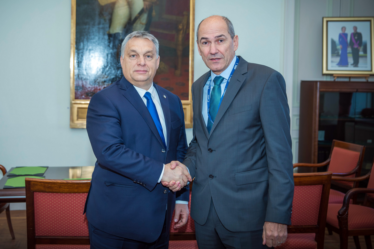
Even so, Janša has assured members of the European Parliament that the required nominations will be made by the autumn.
In his press conference, shared with European Parliament President David Sassoli, and European Commission President Ursula von der Leyen, Janša boasted to journalists of the achievements under the period of the Troika – a kind of committee made up of the current Council president and his immediate predecessor and successor and in which he participated. The achievements included progress on the notion of a COVID passport and showed, he said, that “as a union we can work together and effectively”. His first priority as President of the European Council, he said, was to ensure that as many Europeans as possible are vaccinated against the SARS-CoV-2 virus in all its various manifestations. “I believe we need a European-wide drive, a campaign involving popular opinion-makers, sportsmen, artists, who would convince the people to accept vaccines which are now available in sufficient numbers,” he said. “It’s actually a miracle that we have achieved this situation and that we have enough vaccines, and it would be a great pity if in the autumn we would have to close down Europe just because we have been unable to convince people to get vaccinated.”

I don’t think many within the EU’s various corridors of power would disagree with that wholly uncontroversial sentiment. Janša is on fairly safe ground there, as he is with his chosen slogan for his term of office: “Together. Resilient. Europe.” It’s the “together” part that may prove difficult.
CONTROVERSY AND COUNTER-ARGUMENT
He enters into rather more controversial territory when he asserts that he and his government (and, indeed, any member state government) should be free to take decisions of any sort without the European Commission trying to interfere. “We are not a colony, we are not a second-class member of the European Union,” he told journalists after an occasionally heated debate at the European Parliament at the very start of his six-month presidency. “The EU brings together countries with different traditions, with different cultures. There are different traditions with different cultures. There are differences that need to be taken into account and respected.” But in some other exchanges during a plenary session of the European Parliament, Janša found himself facing a lot of opposition. In the debate, both Minister of Foreign Affairs Anže Logar, on behalf of the Slovenian Presidency of the Council, and Commission Vice-President for Values and Transparency, Věra Jourova, spoke against the recently adopted anti-LGBTIQ legislation in Hungary.
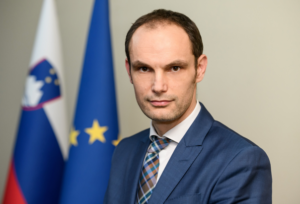

MEPs were critical of the Commission over its lack of action in its Article 7 procedures against Hungary and Poland. What does that mean? Not much, it seems, although it should under EU law. The Article 7 procedure is invoked if there is a “clear risk of a serious breach by a Member State of the values referred to in Article 2.” These are “values of respect for human dignity, freedom, democracy, equality, the rule of law and respect for human rights, including the rights of persons belonging to minorities,” as it says in Article 2 of the Treaty of the Union. In the debate, several MEPs said that the lack of follow-through by EU authorities is leading to the continuous degradation of the EU itself and the proliferation of the sorts of practices that led to the actions being launched. Incidentally, the EU has no power to expel a member state, but it can suspend some of the offending state’s rights. This does not seem to worry the governments of either Hungary or Poland, the alleged offenders, and the Council’s new President, Janša, has expressed some sympathy for their positions. You will not be surprised to read that it all concerns the rights of the LGBTIQ+ community.
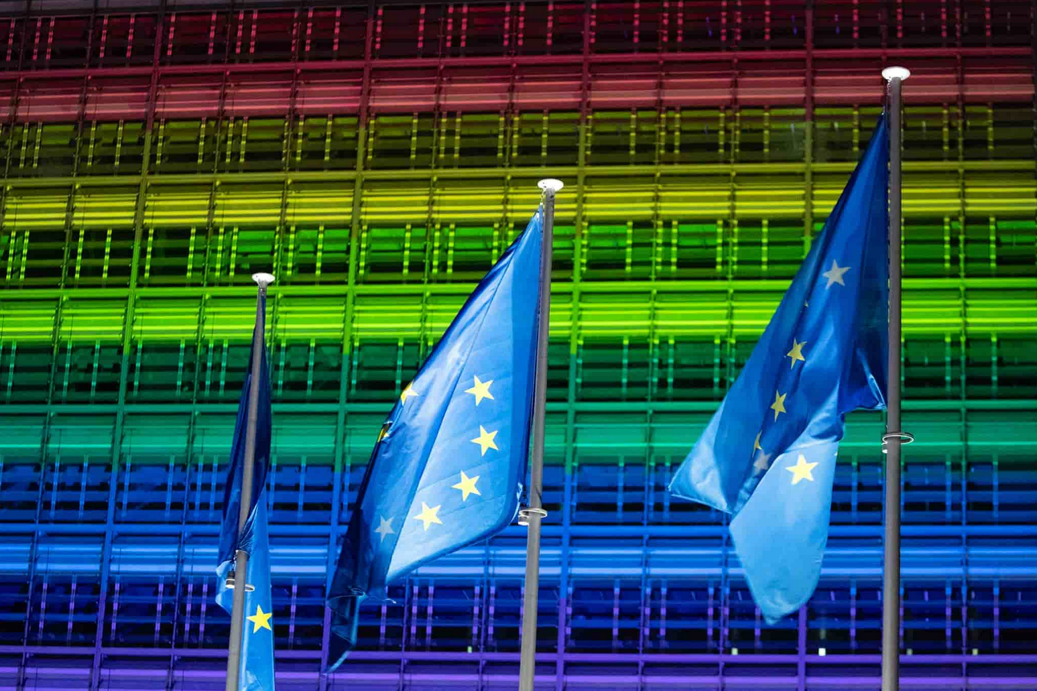
More liberal-minded MEPs fear that young people in those two countries cannot express their sexuality nor their true feelings because they are, effectively, being persecuted. This comes under the umbrella of “anti-paedophilia” legislation. The ban on “promoting it to minors” is an effective ban on mentioning it at all, leaving LGBTIQ+ youngsters feeling not only isolated but unable to contact others like them without breaking the law. Janša has publicly defended Hungary’s right to outlaw the portrayal of homosexuality to children. He has even claimed that imposing “imaginary European values” on central Europe could lead to the union’s collapse. Of course, some (but not very many) MEPs defended Hungary’s new law and accused its opponents of attacking the sovereignty of the two countries and their rights to follow what they call “traditional” values. It has to be said that a law against homosexuality is a bit like a law against having short legs. It won’t make legs grow longer. An anti-LGBTIQ+ law won’t make those who identify that way suddenly change. We are what we think, as the Buddha is supposed to have said.
OLD ALLIANCES AND NEW
One government that has been looking forward to Slovenia’s turn in the EU presidency is Russia. The EU and Russia have not had the easiest of relationships, but European Commission President Ursula von der Leyen is still positive about it. Just ahead of June’s European Council meeting (before Slovenia took over its presidency) she said in a Joint Communication: “History, geography and people bind the EU and Russia. The state of our relationship is complex. We have to identify the challenges and seize the opportunities.” That sounds very positive, but…yes, there has to be a “but”, and it was supplied on this occasion by the EU’s High Representative for Foreign Policy, Josep Borrell: “Under present circumstances, a renewed partnership between the European Union and Russia, allowing for closer cooperation, seems a distant prospect. Our ambition should be to explore paths that could help change the current dynamics gradually into a more predictable and stable relationship.” Moscow clearly hopes Janša can turn things to Russia’s advantage. On a visit to Moscow earlier this year, Slovenia’s Foreign Minister, Anze Logar, in an interview with the Russian press agency, TASS, said: “The events of recent months have brought the development of diplomatic relations between the European Union and the Russian Federation to a very low level.” That’s putting it mildly, bearing in mind land seizures by Moscow and sanctions imposed by the EU. However, Logar continued: “Slovenia supports an open and constructive dialogue both on the current issues of international importance, on which [our] opinions differ, and on issues linking the EU and the Russian Federation.” The EU has said it plans “to constrain Russia’s attempts to undermine EU interests” by becoming more robust and resilient. It’s not clear if Janša can persuade Brussels to pursue a friendlier course. He may feel he has to: some 40% of Slovenia’s gas imports come from Russia and a recent Eurobarometer sounding of popular opinion found that 45% of Slovenians view Russia positively. But Moscow should also bear in mind that Slovenia has also expressed a willingness to play a positive rôle in promoting better EU relations with China.
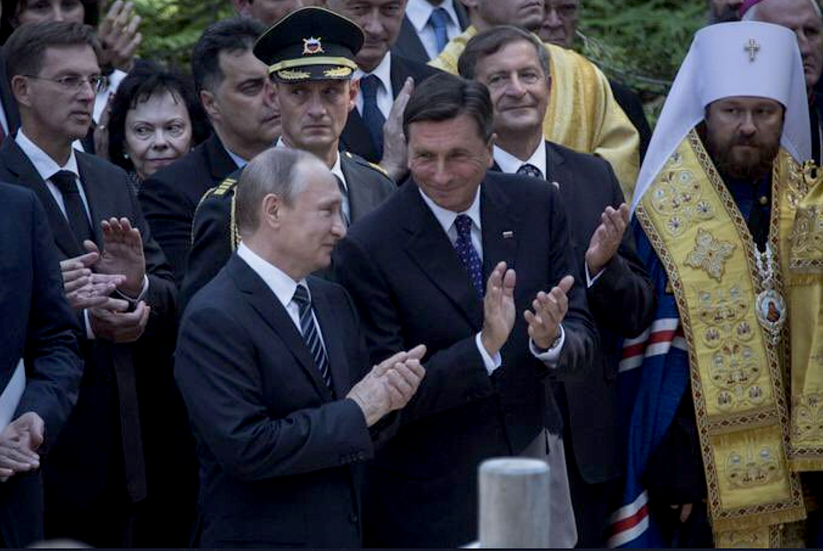
At the launch of Slovenia’s presidency at Brdo, just outside Ljubljana, Janša was asked what he thinks about “illiberal democracies” such as those in Hungary and Poland, but he argued that all mainstream political orientations should receive equal treatment. “I cannot agree to the division between liberal and illiberal democracy,” he said. “Democracy is democracy.”
That rather overlooks the fact that the EU is built on a foundation of liberal democracy. In fact, the whole occasion was fairly tense, with the Commission President, Ursula von der Leyen reminding Janša to: “Trust in solid institutions, trust in independent and efficient judicial systems, trust in free and independent and properly funded media, trust that freedom of expression, diversity and equality are always respected and that the rule of law and European values are always upheld.
This is the very essence of the European Union. This is how we earn the respect of the global community and this is the key to recovering and living together as a union.” Janša denied there was any serious division among EU national leaders, although he admitted that discussions had been “heated”. Janša repeated his support for Orbán’s views on the issue of the LGBTIQ+ community.
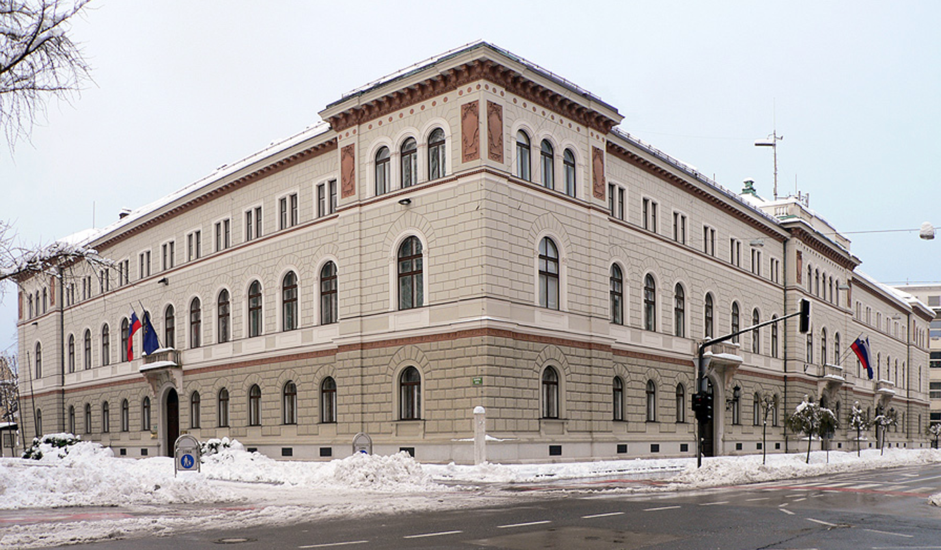
Janša also stands accused to endangering media freedom, as well as encouraging hate speech and mishandling the pandemic (he is not alone there, of course). He, for instance, has been keeping a strict hold on the funds for Slovenia’s only news agency, STA, although he has said the issue will soon be resolved in some as-yet unexplained way. He also accused left-leaning journalists of applying pressure and showed a video to back up his claim. “You are accusing this government of suppressing media freedom,” Janša said, “when we defend ourselves.
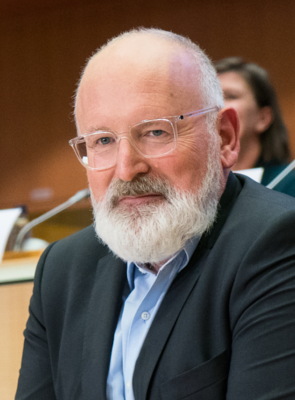
We are under attack all the time, so this is not suppressing media freedom.” His use of the video images at a meeting to mark the start of Janša’s presidency offended some of the Commission. It showed members of Slovenia’s judiciary in conversation with Social Democrat MEPs. One of the Commissioners present, Executive Vice-President Frans Timmermans, walked out and refused to be in the traditional ‘family portrait’ afterwards, saying “I simply could not be on the same podium with Prime Minister Janša after his unacceptable attack.”
CRITICISM ON EVERY SIDE
It has been suggested that much of Janša’s rhetoric is aimed at shoring up the conservative vote at home, his abusive Tweets attracting attention while his alleged abuses of power go unnoticed. He certainly likes to stir things in Europe, something which may backfire on him. After Orbán pulled his (already suspended) Fidesz party out of the European Parliament’s largest political group, the centre-right European People’s Party (EPP) – mainly for being too ‘centre’ and not enough ‘right’ for Orbán – Janša suggested he may decide to follow suit. He claimed to journalists that it was the EPP that had changed, not his party. The accuracy of that claim may be questioned in Brussels and Strasbourg, but probably not back in Ljubljana, nor may it matter much in the long run. The figuration of the EPP has never much interested domestic followers of politics. As it is, Janša has put out lots of criticism for the EU bureaucrats and the media, but he has not yet proposed changing Slovenia’s laws.
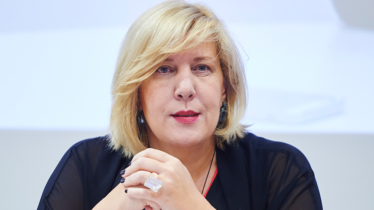
Interestingly, one of the most trenchant criticisms of Janša came from the Commissioner for Human Rights at the Council of Europe in Strasbourg, Dunja Mijatović. In case you are unfamiliar with the city, the Council and the European Parliament are housed in different buildings and have been since 1989. Up until then, they had shared the Council of Europe’s own Palais de Europe building, with the Council staff a permanent fixture and the MEPs and their staff rather irritating visitors. But with EU enlargement, its MEPs could no longer be squeezed into the Council’s splendid hemicycle, nor its oddly arranged offices, and a new building was erected next door, connected by a corridor that was locked at the end of each afternoon. The Council however, despite lacking the EU’s theoretical powers, still does good work and is in charge of, for instance, the European Court of Human Rights. It was on the issue of human rights that the warning was issued. Mijatović warned that some of the steps taken by the Slovenian government in recent months “risk undermining the ability of independent voices to speak freely.” She pointed out that hostile public discourse, as well as smear campaigns and intimidation targeting civil society activists and those who express critical opinions, harm free expression and can have a chilling effect on media freedom. She called on ‘particular members’ of the government (without naming anyone) to make reasonable and dignified use of social media platforms. “Members of the government must refrain from making stigmatizing and misleading comments about the work of civil society, and should publicly condemn such discourse by others.” Mijatović wrote that she “regrets” that the Slovenian government “appears to have used the COVID-19 pandemic to discourage the free expression of dissent or political opposition.” She went on to say more clearly exactly what she means. “Several measures restricting the right to protest,” she explained, “including prolonged blanket bans on public assemblies and heavy fines imposed on protestors, seem disproportionate and risk undermining freedom of expression.” That wasn’t Mijatović’s only concern, either. She mentioned a deterioration of the conditions underpinning media freedom in Slovenia, including, she says, “harassment, intimidation and criminal lawsuits against journalists, restrictions on access to public information, and government actions against public service media”. The Human Rights Commissioner is also very concerned about a trend towards sexist harassment and misogynistic speech against female journalists. Interestingly, Hungarian oligarchs allied to Viktor Orbán have invested millions of euros into Slovenian media, circumventing Slovenia’s media laws by using a complex network of intermediaries and shell companies. Outside observers are worried.
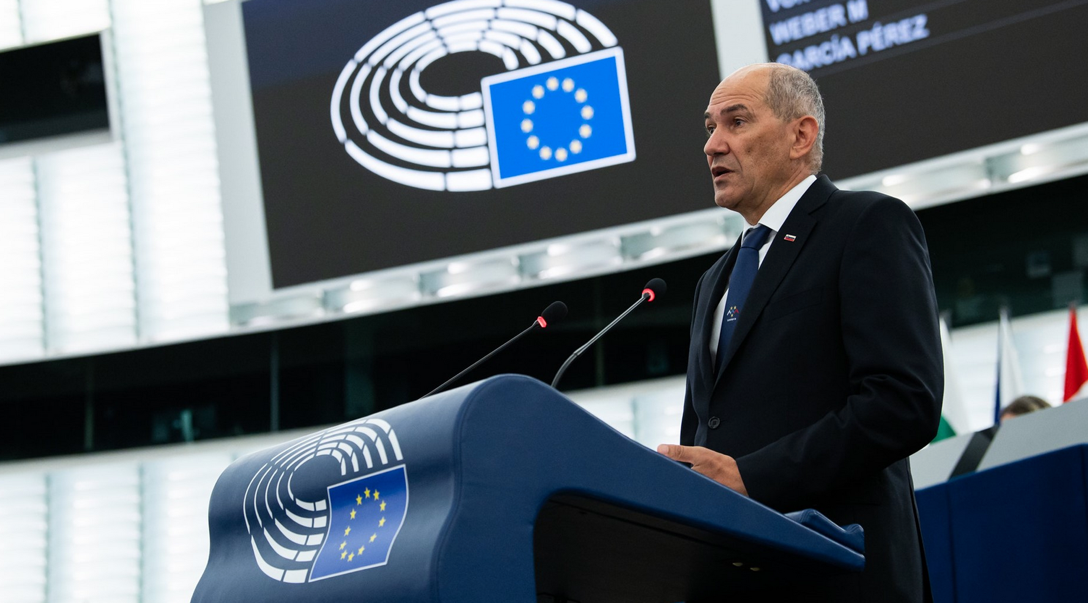
In his address to the European Parliament, Janša mentioned the coming conference on the future of Europe and seemed to sound a muted warning. “We are talking about a common European future,” he said, “therefore we are called upon to participate in these discussions, without making anybody feel like they are called upon or elected to dictate or teach others about Europe or the future of Europe. What we have to focus on is guaranteeing fair and equal discussion so that everybody can share their views on the future of Europe.” Meanwhile, as the Politico website reports, Janša seems to have been waging a kind of war on journalists, at least those who don’t agree with his views. “POLITICO spoke with over a dozen journalists, including senior staff at Slovenia’s public media outlets. Many of them accuse Janša of whipping up hatred against public media reporters and editors, resulting in threatening phone calls, letters, emails and messages on social media. Journalists say the pressure has led to self-censorship and that some editors have resorted to calling police over threats.”
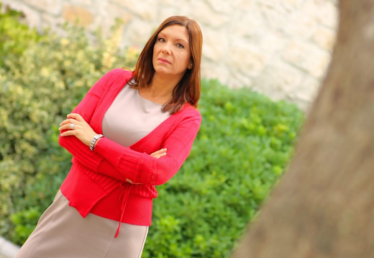
Global Voices (a website) reports on a frightening example of misogynistic bullying. The target on this occasion was an investigative journalist, Evgenija Carl. After she produced a television report about Janša’s party, the SDS, Janša, who was a leading politician but not prime minister at the time, used his Twitter account to call her a prostitute. His attacks on her worsened when he became prime minister. Carl reported the abuse to the police. “He called my colleague and I, a journalist working in the field of international politics for the national Slovenian Television station (RTVSLO), “retired prostitutes”” she said, “who sell our services for 30 to 35 euros.” One of the subsequent Tweets (which I must warn you may cause offence), said: “Brothels offer cheap services of retired prostitutes Evgenija C and Mojca PŠ. One for 30€, second for 35€. #PimpMilan.” This may not seem very presidential language, perhaps. Unsurprisingly, Carl and her colleague brought a legal action once the perpetrator became clear. She takes up the story again: “My colleague and I filed a lawsuit against him and once again we were targeted by him and his loyal followers, among them politicians and some extreme right-wing media. This is an unprecedented lawsuit in Slovenia and it is still ongoing. I knew the path that followed would not be easy, but I never imagined the onslaught of attacks we would face—it was like a stampede.”
GOOD NEWS, BAD NEWS
But of course, in a European Union where free speech matters and anyone can hold any views they like, Janša’s opinions are his own and he is entitled to them. His supporters, however, do not have the right to send death threats, packets containing an unidentified white powder and chauvinistic messages to Carl, nor to make derogatory remarks about her children on line. According to Carl, she was accused of being the organiser of a social media protest, merely for sharing a notice that parents and children planned to stage a protest against school closures. She was accused, she says, of causing death because, it’s alleged, the protestors spread the COVID-19 virus. Again, writing in Global Voices she says: “Janša manipulates photos, recordings, spreads lies, and says that I am among those who help spread the virus and sow death. He called my colleagues and me the ‘coalition of death.’” This sort of thing doesn’t seem to fit comfortably with his call, at the European Parliament, for a “common European future” nor that statement that “What we have to focus on is guaranteeing fair and equal discussion so that everybody can share their views on the future of Europe.” If his perception includes the right to post misogynistic Tweets and emails, Europe’s future may not be quite what many Europeans may hope for.
Certainly it worries the Council of Europe, which, though far weaker than the EU, involves a wider range of countries and can afford to be outspoken, such as in this on-line posting: “On 6 May 2021, the Prime Minister of Slovenia Janez Janša posted a tweet implying that the director of the Slovenian Press Agency (STA) had been involved in the ‘murder’ of a former STA editor-in-chief more than a decade ago. The PM tweeted: ‘Amazing for EU in the 21st century that a collaborator in the murder of a journalist is still leading the STA and therefore pays (“is paid”, I’m guessing) €8,500 per month. More than the president of the republic.’ It was one of a series of tweets posted by the Janša attacking Bojan Veselinovič.”
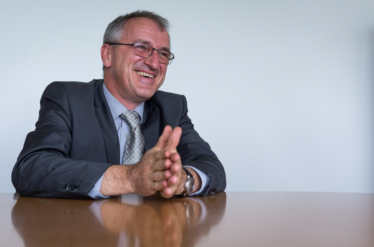
It was, says the Council, totally untrue and explains it like this: “The allegation refers to the death of Borut Meško, editor-in-chief of the STA in the late 2000s. Meško had been handed a termination notice in November 2009 due to his failure to draw up strategic plans despite a prior warning. He died the following year. International press freedom groups said the accusations by Janša were the latest act of pressure against the STA director and part of a wider effort to undermine and destabilise the work of the press.” Having said all that, Slovenia still comes in at number 36 in the world press freedom rankings of RSF (Reporters Sans Frontières), which is just two behind France and three behind the UK. The Czech Republic and Italy come lower, at 40 and 41.
There is concern, too, at Janša’s alleged anti-immigration stance, despite his speech calling for economic help for poor countries in Africa, the alternative being the erection of impermeable barriers to keep asylum-seekers out. I’ve heard humanitarian organisations say much the same. Certainly, many would favour action to help poor African countries economically and in peace-keeping; the countries themselves cannot afford to lose through migration the very people they will need most in the future. As to the impermeable barriers, well; if it was said to shock the EU into action, it’s not a bad thing to say. In a comment on Slovenia’s Presidency of the European Council, the United Nations High Commission for Refugees (UNHCR) sounded hopeful. “Building on the progress made under its predecessor, Portugal, including advancing work to establish a European Union Asylum Agency, we at UNHCR are hopeful that the incoming Slovenian EU presidency will continue to build bridges and explore avenues to broker agreement on the proposed EU pact on Migration and Asylum.” The statement goes on to call for a “truly common and sustainable system”. UNHCR wants to see a policy to address migration and one under which refugees are regarded as “people fleeing horrific war, violence and persecution. And a fair one that also works for all countries across the EU equally as they share responsibility for refugees, in the spirit of the Union and its values.” Will Slovenia under Janša provide a safe haven for the dispossessed?
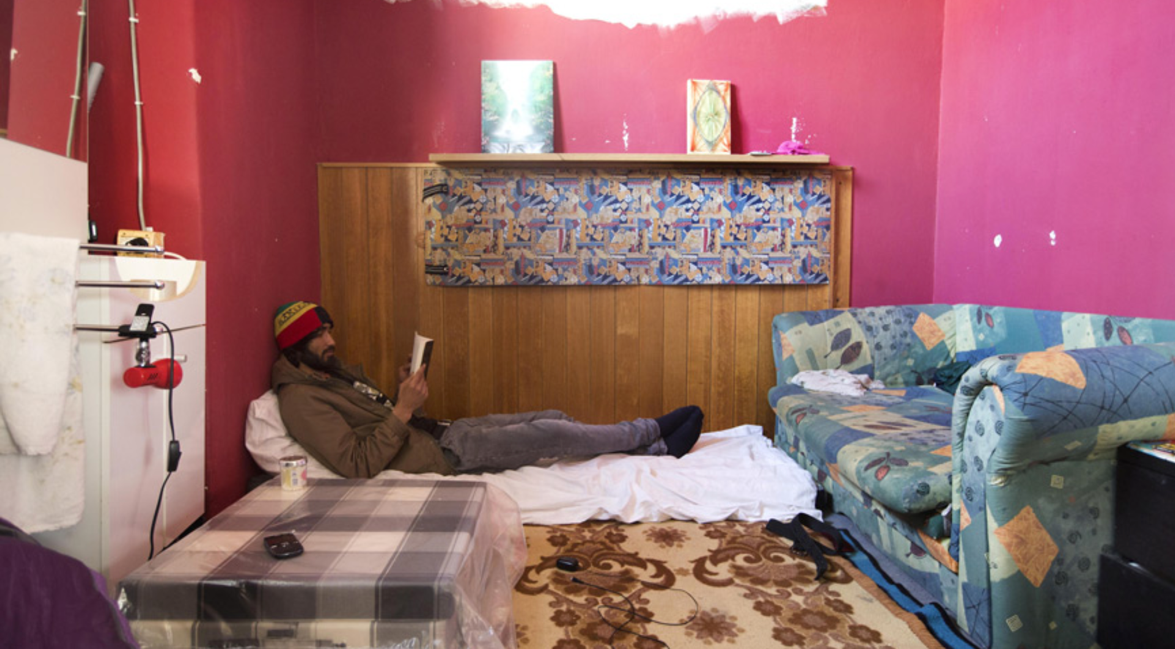
We cannot be certain, of course, and Janša could surprise his critics with a truly humanitarian attitude towards migration, such as the economic help to Africa mentioned in his speech. However, an Italian court recently halted deportations to Slovenia on the grounds that there is a risk that asylum seekers will be subjected to inhumane and degrading treatment, as they are likely to be further expelled to Croatia and then to Bosnia or Serbia. Courts have also found that systemic deficiencies in the Slovenian asylum system mean breaches of the provisions of Article 4 of the EU Charter of Fundamental Rights are likely. (Article 4 means “Prohibition of torture and inhuman or degrading treatment or punishment. No one shall be subjected to torture or to inhuman or degrading treatment or punishment”)
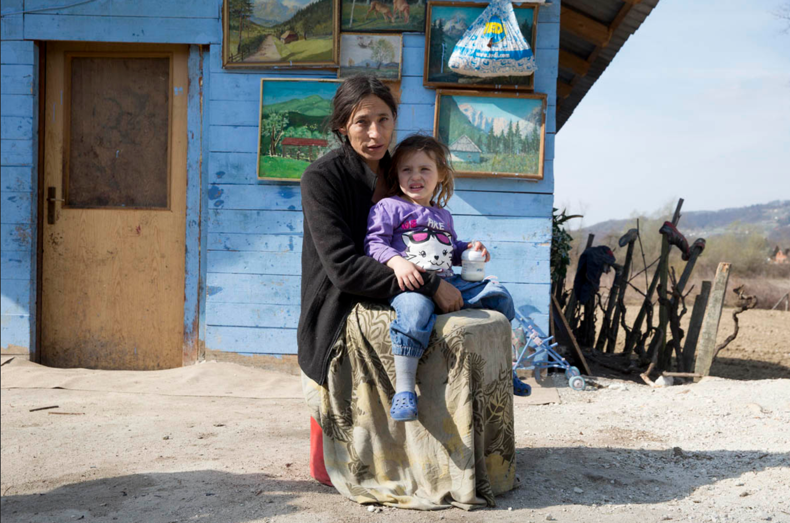
There is also concern over the treatment of the 11,000 or so Roma people living in Slovenia, very often in extreme poverty with high unemployment, high child mortality rates and social exclusion. I have seen close-up their living conditions in other countries of Eastern Europe. Most of the women try to be houseproud, but it’s not easy in a tar paper shack with no running water, nor windows. Those I visited, though, were clean and as well cared-for as a leaky shack can be, except where they had been housed in the condemned tower blocks, whose crumbling stairways were a death trap. Opposite the towers was a vast garbage tip, running with rats. That was not in Slovenia, it was in Romania, but the Roma (just like the Sinti and others sometimes labelled ‘gypsies’) always get a raw deal, everywhere.
Amnesty International believes there have been improvements in Slovenia, although they remain worried about the Roma. “Since its last review, Slovenia made considerable progress,” it says in an on-line press release, “including through the adoption of progressive legislation and measures with respect to family law and anti-discrimination. While Amnesty International welcomes these measures, it remains concerned about the persistent discrimination and social exclusion of the Roma population, as well as Slovenia’s treatment of migrants and refugees.” Slovenia, uniquely, passed laws to establish access to drinking water as a human right, although Amnesty points out that “many Roma communities living in informal settlements in the southeast of the country continue to be denied access to drinking water and adequate sanitation.” Meanwhile, Janša, within a year of taking office as Prime Minister, sought to amend the law in order to help large construction companies gain access to sensitive water sources. “Discrimination against and social exclusion of a large proportion of the Roma community continues,” says Amnesty, “especially in the southeast of the country. The government still does not officially collect desegregated data on minorities, and the consequent lack of reliable information about the size of the Roma population and their underlying socio-economic conditions, limits the ability to develop and execute targeted measures to address and improve their situation.”
THE END OF THE WORLD? NOT YET
To summarise, the EU now has as the President of the European Council, the most controversial figure of recent years. But he lacks the EU-wide support to push through measures that are considered too illiberal. He may not even try. Even the autocratic Orbán, with his huge domestic majority (something Janša lacks) may not win in the long term. Indeed, that may not even be his intention. The EU, with its wide range of opinions and its armies of bureaucrats, cannot easily be persuaded to change course. It’s like a vast super-tanker, chugging across the Sargasso Sea.
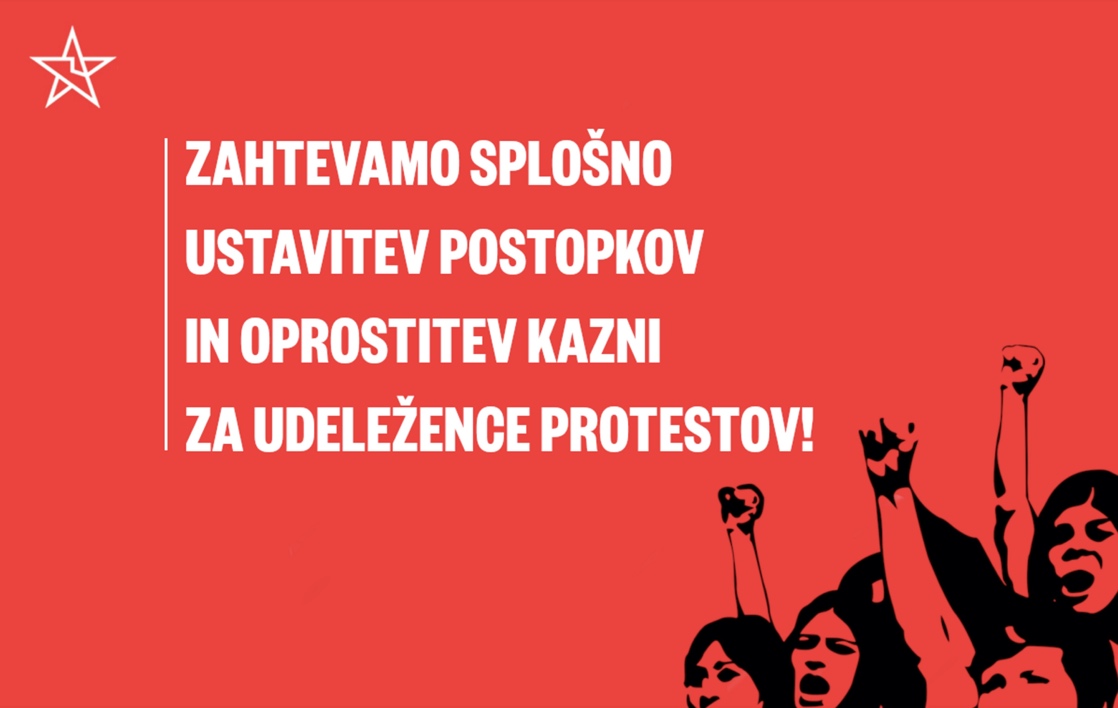
Turning it around involves slowly overcoming its vast inertia. It can take three kilometres and a quarter of an hour to turn one around and it has a turning circle, by the way, of around 2 kilometres, so you will need a lot of space. In the case of the EU, it would take far longer than 6 months, especially with other members of the crew trying constantly to grab the wheel and pull it in a different direction. The Politico website has expressed the concern of many about Slovenia’s Presidency of the European Council, based on Janša’s recent record. “Since coming to power for the third time in early 2020,” it writes, “Janša has used the COVID-19 pandemic to push unrelated priorities, like restricting the rights of environmental organizations, and has attempted to ram through others, like giving policing power to the military. He has tried to outlaw Levica, Slovenia’s third-largest opposition party; moved to evict NGOs from state-owned properties; refused to fund the Slovenian Press Agency, the independent state wire service; interfered with the work of the state prosecutor’s office, as well as the European Public Prosecutor’s Office; been indicted on corruption charges; and created a climate of hostility — particularly toward female detractors — through his venomous Twitter account.” It adds: “This is not an exhaustive list”. Janša believes that anyone who criticises him is “in league” with opposition parties, and that includes the judiciary.
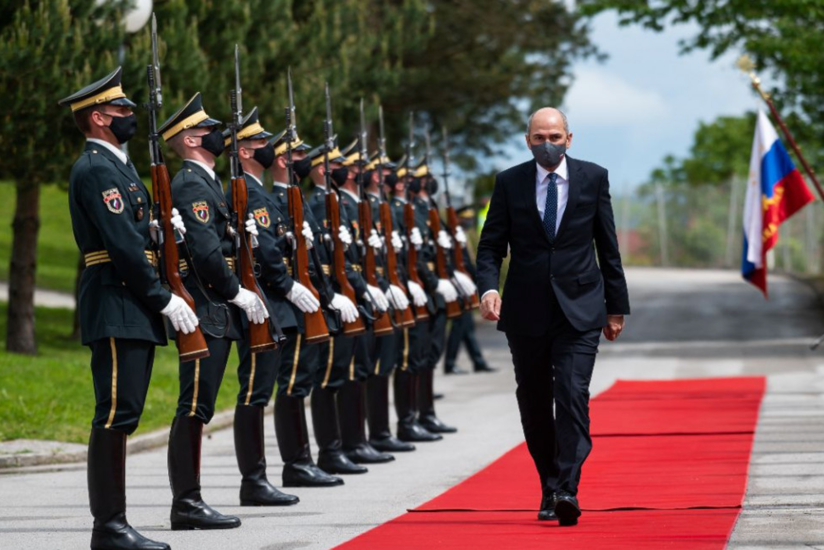
The photograph that so offended Frans Timmermans merely showed a number of Slovenian judges in conversation with Social Democrat MEPs. Does that count as “fraternising with the enemy”? I really have no idea, but it does seem a somewhat extreme reaction on Janša’s part. If, when his half-year term comes to an end, the EU is funding economic development projects and peace-keeping measures in Africa he will be cheered to the echo. If he supports the foundation of a European Union Asylum Agency which seeks to help immigrants who have escaped wars and hunger, if he becomes a true supporter of press freedom, he will go down in EU history as having been a great president. His past record would seem to cast doubt on the likelihood of that happening, but it’s much too early to tell. As the Bible says, “judge not, that ye be not judged” (Matthew VII, i). There will be plenty of time for that anyway when the term of office ends.
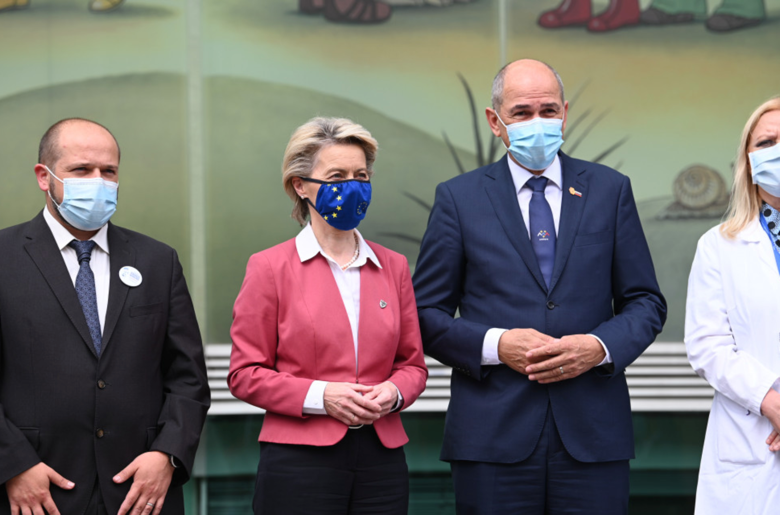
Meanwhile, the Council of Europe is worried about what may happen during the Slovenian EU Presidency; again, it’s Janša’s record that causes concern: “On 6 June 2021, Prime Minister Janez Janša said in a tweet that the Council of Europe Commissioner for Human Rights, Dunja Mijatovic, is “part of #fakenews network” in a comment on her recent memorandum on freedom of expression and media freedom in Slovenia (mentioned earlier in this article). The Prime Minister’s tweet quoted Mitja Iršič, a public relations expert at the Ministry of Culture, who said their considerations had not been properly represented, and called the Commissioner’s report “biased and ill-informed.” It would seem that Janša is happy to continue his war with what he considers to be the liberal mainstream. According to the old saying, ‘a leopard cannot change its spots’. However, Sy-Sang Liaw and Ruey-Tarng Liu of National Chung-Hsing University in Taichung, Taiwan, and Philip Maini of Oxford University’s Mathematical Institute have successfully adapted an equation first published by the mathematician and code-breaker Alan Turing to explain the pattern of a leopard’s spots. They had to adapt it because it failed to explain the change in the spot pattern between leopard kittens and full-blown adults. So, it seems that leopards can and do change their spots as they mature, albeit only once. In Janša’s case we can only wait and see. Janša would not have approved of Turing anyway; he was gay. Meanwhile, perhaps Janša should take note of something written by the English poet, Percy Bysshe Shelley, who had little time for seekers after power and glory. “Titles are tinsel,” he wrote, “power a corrupter, glory a bubble and excessive wealth a libel on its possessor.” It should be an interesting six months.

